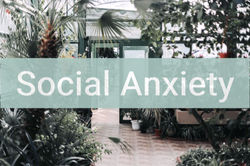THERAPY
Everyone seeking therapy has their own story and so therapy will always be tailored to your individual needs and hopes. Below will give you an idea of how therapy can look and what you can expect.
What to Expect
1
Arrange a Call
This will be a 10-15 minute phone consultation where we will ask you a few questions about your difficulties and how you would like things to be different. We can answer any questions you may have and ensure that we will be a good match to work together.
To arrange your free initial consultation please get in touch.
2
Create a Plan Together
The first few sessions will explore your difficulties in more detail.
This helps us to build a picture of what’s bringing you to therapy including how your difficulties developed and what might be keeping them going. From this we can think together about some goals and create a plan of how we can work towards them.
3
Therapeutic Work
This is the main part of therapy. As it's always tailored to each individual, the type of therapy will depend on the difficulties you're experiencing and your goals. Therapy can be short-term or long-term; and structured or more free flowing. We will regularly check-in to ensure you are getting what you hoped for from the sessions.
Types of Therapy
As Psychologists we are fortunate to be trained in a number of therapeutic approaches and may use one approach, or integrate multiple, depending on what will be most helpful for you. Here are some of the therapeutic approaches that we use.

CBT
Cognitive Behavioral Therapy helps identify and change unhelpful thinking patterns and behaviours. It focuses on the connection between thoughts, feelings, and actions, aiming to develop healthier ways of thinking and coping with challenges.

Psychodynamic
Psychodynamic therapy explores how unconscious thoughts, past experiences, and early relationships influence current behaviour and emotional struggles. It aims to increase self-awareness and insight by examining patterns, defenses, and unresolved conflicts, often rooted in childhood.

EMDR
Eye Movement Desensitisation and Reprocessing helps you to process and overcome traumatic experiences. It uses eye movements, sounds or taps while you recall traumatic events, helping the brain reprocess the memories and reduce their emotional impact. As well as PTSD, EMDR is also effective in managing anxiety, phobias, and more.

Acceptance & Commitment Therapy
ACT helps people accept difficult thoughts and feelings instead of avoiding them, and commit to actions aligned with their personal values. It combines mindfulness strategies with behaviour change techniques to increase psychological flexibility and improve well-being.

Schema Therapy
Schema Therapy is an integrative approach which helps people identify and change long-standing patterns or "schemas" formed in childhood. It focuses on understanding unmet emotional needs and updating maladaptive coping styles that may otherwise contribute to ongoing emotional and relational difficulties.

Mindfulness
Mindfulness therapy teaches you how to focus on the present moment and accept your thoughts, feelings and bodily sensations without judgment. It aims to reduce stress, improve emotional regulation, and break patterns of reactive or automatic behavior.
Locations
Lion Yard, Tremadoc Road, Clapham, London, SW4 7NQ
Northcote Road, Battersea, London
SW11 1NT
Battersea Rise, Clapham Junction, London
SW11 1EH
Get in Touch
We'd love to hear from you. Please use the contact form or get in touch directly.
Email: charley@charleydeacon.co.uk












